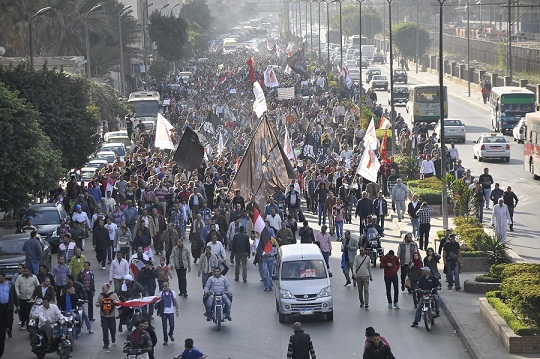By Michel Sailhan / AFP
ISTANBUL: For many in the Arab world, Turkey embodies something of an elusive ideal: an Islamist-based democracy with a strong economy.
A survey published Thursday by the Turkish Economic and Social Studies Foundation, a non-governmental think-tank, found almost 80 percent of respondents in the Middle East had a favorable view of Turkey, and three out of five considered the country a model for a modern Islamic state.
Following last year’s Arab Spring uprisings, an unprecedented wave of popular revolt that swept the Arab world and led to the ouster of a string of dictators, many analysts are wondering if Turkey serves as a useful example of what a moderate Islamist democracy looks like.
The country is seen as having “reconciled two dynamics: economic growth and a democratic system put in place by an Islamist-derived party,” Turkish foreign policy expert Sinan Ulgan said.
Turkey, a secular Muslim-majority country that straddles Europe and Asia, is viewed especially favorably by many in Libya, Tunisia and Egypt, countries in which Ankara backed the sprawling Arab Spring protest movements which led to the toppling of their dictators.
Turkey’s economy has staged a strong recovery after a severe recession, with gross domestic product (GDP) growing 8.9 percent in 2010 following a contraction of 4.7 percent the previous year.
GDP rose by a record 9.6 percent during the first nice months of 2011.
Prime Minister Recep Tayyip Erdogan’s AKP party, the Islamist-based party that has been in power since 2002, won a broad victory in June parliamentary elections, gaining 50 percent of the votes.
But some analysts temper the notion of Turkey as a model democracy, pointing to clampdowns on journalists and ongoing problems with the country’s sizable Kurdish population.
About 15 million Kurds live in Turkey, which has a total population of 73 million. The Kurdish population has for decades been trying to establish an independent state in Turkey.
Since 1984, the outlawed Kurdistan Workers’ Party (PKK) has led an armed rebellion in the Kurdish-majority southeast that has claimed some 45,000 lives.
A 2009 attempt to grant more rights to Kurds and sap support for the PKK went nowhere, and fighting has resumed along with mass arrests.
Critics also point to what they call the “Putinization” of Erdogan, referring to the Russian prime minister’s at-times hardline stance against opponents.
“The number of those who are filling jails because of their opposing views and actions and those who are agonized by legal proceedings is increasing,” wrote university professor Ahmet Insel in the daily Radikal newspaper. “(The) number of arrested university students is increasing and except a few weak voices, academia is silent.”
At least 70 journalists and writers have been arrested for articles, according to rights groups and media outlets.
Some have been in prison for four years, accused of anti-government sedition, said columnist Semih Idiz in the Milliyet daily newspaper.
“They will probably get not restitution for this, if proven to be innocent in the end, unless they go to the European Court of Human Rights,” Idiz said.
The journalist-defending group Reporters Without Borders said Turkey had failed to implement reforms and continued to target journalists.
“Overseas, we are well aware of these shortcomings in democracy,” Ulgen said, “but Erdogan’s regime keeps on feeding the imagination because compared to political systems in Iran or Saudi Arabia, Turkey’s is preferable.”
For Tunisian academic Amor Boubakri, Turkey’s successes would not be easily replicated in Tunisia, which last year saw the overthrow of its president Zine El Abidine Ben Ali, because the country has an increasingly vocal radical Islamist sector.

